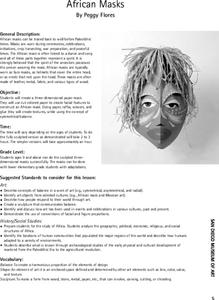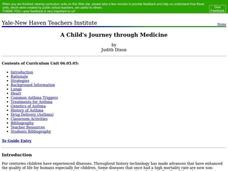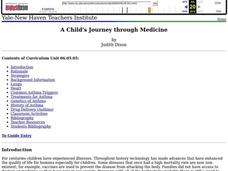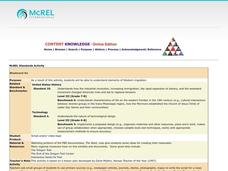Curated OER
African Masks
Fourth graders create three-dimensional paper African masks. They analyze the geographic, political, economic, religious, and social structures of Africa. they discover that masks were worn for various ceremonies.
Curated OER
John Brown, Then and Now
Eleventh graders identify some of the ways that the raid at Harper's Ferry influenced the Civil War. They articulate the different ways that people though about John Brown in the 1800's and how his persona may or may not have changed...
Curated OER
Lone Stars and Gun Smoke
Seventh graders assess the significance of the Texas Ranger Frontier Battalion Company 'D' in maintaining law and order along the Texas-Mexico border. They study the importance of Ranger actions and utilize primary sources and maps to...
Curated OER
Celebrate Hispanic Heritage Month!
Students use information from the U.S. Bureau of the Census to create a bar graph, a picture graph, or a circle graph showing the country of origin of U.S. Hispanics.
Curated OER
A Child's Journey through Medicine
Students experience a variety of activities that relate to human physiology and their functions. They create graphs and charts after testing their heart rates and blood pressure They conduct a survey of the student body and create ...
Curated OER
A Child's Journey Through Medicine
Fifth graders identify the symptoms of asthma. In this biology lesson plan, 5th graders draw and label models of heart and lungs. They conduct a survey on asthma and construct graphs based on result.
Curated OER
From Corn To Tortillas
Students investigate the food known as the tortilla. They research the growth cycle of the corn plant and how tortillas are made from it. The importance of the tortilla according to the Hispanic culture is explained to the students. The...
Curated OER
The Chicano Movement in California - Culture, Causes, and Community
Students explore the culture and community of the Chicano movement in California using prints that emerged from the Chicano movement. The historical, binational, and bicultural components are examined in this three lessons unit.
Curated OER
Westward Ho
Learners examine primary sources regarding Western migration. In this Manifest Destiny lesson plan, students determine why the pioneers moved west and what the trip was like as they examine sources and write journals based on their...
Curated OER
Planning a Railroad
Students use a topographical map to plan a route from Doknner Summit to Truckee, then compare it to the route selected by Theodore Judah.
Curated OER
American Political Thought: Minority Influence
Sixth graders brainstorm the reasons why people would want to leave their homeland to live in the United States. In groups, they research the political representation of the Board in New Haven, Connecticut. They also write a paper on...
Stanford University
Stanford History Education Group: Mexican Labor in the 1920s [Pdf]
[Free Registration/Login Required] Review historical documents of Mexican-Americans in the 1920's. Students will address what it was like to be a Mexican in America during this time considering working conditions, home life, etc.
Library of Congress
Loc: The Huetzotzinco Codex
Through the ancient natives of Puebla, Mexico, teachers can use this lesson plan to help middle schoolers relate math and reasoning skills to primary sources discussed in social studies. Primary sources are available to figure out more...
US National Archives
National Archives: Lesson Plans Congress, the President, and the War Powers
Examine the power of Congress to make war by studying primary source documents from various wars throughout U.S. history. Students will analyze how the balance of authority between the legislative branch and executive branch has changed...
Rock and Roll Hall of Fame
Rock & Roll Hall of Fame: Lesson 50: Using Music to Teach Personal Narrative
The personal narrative, apart from appearing as an option in the writing component of many state assessment tests, is a form of writing which allows students the chance to reflect seriously and honestly on important events in their own...













![Stanford History Education Group: Mexican Labor in the 1920s [Pdf] Lesson Plan Stanford History Education Group: Mexican Labor in the 1920s [Pdf] Lesson Plan](https://d15y2dacu3jp90.cloudfront.net/images/attachment_defaults/resource/large/FPO-knovation.png)
